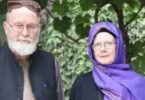Hidden deep in the vast expanse of the Pacific Ocean, the Pitcairn Islands form one of the most remote and unique communities on Earth. This tiny British Overseas Territory consists of four islands—Henderson, Ducie, Oeno, and Pitcairn—scattered across hundreds of miles of ocean.
Despite their collective land area of just 18 square miles, only Pitcairn itself is inhabited, making it one of the least populated places in the world.
Though officially governed by the UK and recognising King Charles III as its monarch, Pitcairn couldn’t be further from the cold, damp climate of Britain.
Instead, the islands boast a warm and lush subtropical environment, with temperatures ranging from 18C to 30C throughout the year. Summers, which last from December to March, typically average around 25C, while the mild winters from June to September rarely drop below 18C.
For the few dozen residents of Pitcairn, this means that while much of the UK is battling icy weather, they are basking in summer sunshine. In recent weeks, temperatures have even neared 30C, making Pitcairn a tropical paradise compared to the chilly British winter.
The islands were originally settled by Polynesians, who are believed to have lived there as late as the 15th century before mysteriously vanishing. European explorers, including Portuguese and British sailors, first came across the islands in the 17th and 18th centuries but never settled permanently.
That changed in 1790 when the infamous mutineers of HMS Bounty—led by Fletcher Christian—arrived on Pitcairn with several Tahitian men and women. Hoping to escape the reach of the British Navy, they established a small colony in complete isolation. For nearly two decades, their existence remained unknown until American whalers stumbled upon the island in 1808.
Over time, Pitcairn became a regular stop for passing ships, and trade routes between North America, Britain, and Australia brought occasional visitors. Today, every permanent resident of Pitcairn can trace their lineage back to the Bounty mutineers, with the wreck of the ship still visible beneath the island’s waters.
Despite its fascinating history, Pitcairn faces a major challenge in its declining population. With fewer than 50 permanent residents, it is one of the least populated territories in the world. To attract new settlers, the Pitcairn government has launched a scheme offering free land to those willing to move to the island and build a life there.
The programme aims to bring in individuals and families who can contribute to the community, but it comes with challenges. The Pitcairn Immigration website warns potential newcomers: « Life on Pitcairn will not be for everyone. The island’s isolation and small size at times make life on Pitcairn physically demanding and challenging. Residents need to be able to turn their hand to a wide range of tasks and handle difficulties with pragmatism and creativity. »
Pitcairn offers a simple, off-grid lifestyle, with no large-scale employment opportunities beyond small-scale tourism, farming, and government services. Supplies arrive only a few times a year by ship, and there is no airport, requiring all travel to be done by sea. Internet access is available but limited, and medical facilities are minimal, with serious cases requiring evacuation to New Zealand.
The people of Pitcairn speak English, but they also have a unique dialect known as Piktern—a blend of English and Tahitian, developed by the original settlers. The island retains its British links in governance and law, but its cultural heritage is deeply tied to the traditions of the Bounty descendants and their Polynesian ancestors.
Although King Charles III has never visited Pitcairn, islanders marked his accession to the throne in 2023 with celebrations. They also honoured Queen Elizabeth II’s passing by ringing the island’s bell 96 times—once for each year of her life.
For those seeking a truly off-the-grid existence in one of the world’s most remote locations, Pitcairn offers a rare opportunity. But with its isolation, limited infrastructure, and small community, life on the island is far from easy. The free land programme remains open, but few have taken up the offer, proving that while Pitcairn may be paradise in many ways, it is not for the faint-hearted.
Source link








